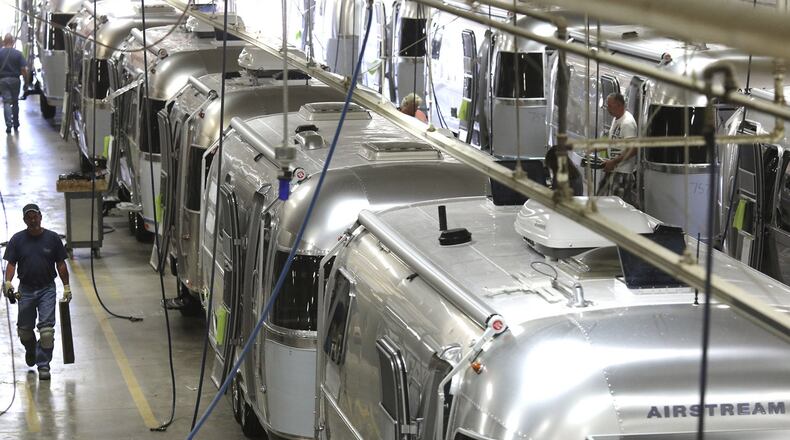Last year, RV sales fell four percent. Sales so far in 2019 are down about 19 percent, said Kevin Broom, a spokesman for the Reston Va.-based RV Industry Association, a trade group.
The industry expects RV sales to fall some 14 percent for all of 2019. If so, that would make two straight years of falling RV sales.
MORE: Fuyao CEO disputes translation in Netflix doc 'American Factory'
Broom said RV shipments have fallen in five distinct periods since 1981. Three of those periods were followed by a recession, he said. Two weren’t.
But when sales drop two straight years or more, the U.S. has typically seen a recession.
Even that gets tricky, Broom cautioned. Sometimes recessions strike in the third year of falling RV sales. And when RV shipments fell in 2007, the Great Recession hit that same year.
Michael Hicks, a Ball State University economist in Indiana, said RV sales offer one piece of data to consider.
“A RV is a fairly business cycle-sensitive purchase,” Hicks said. “Nobody wakes up one day and says, ‘I’ll just go out and buy myself something between a $15,000 and $400,000 recreational vehicle.’”
RELATED: UPDATED: Attorneys move to release pal of Dayton shooter
He described the purchases as “fairly deliberative,” especially at the higher end of offerings, beyond pull-behind trailers, Hicks said.
“If we are in a downturn, that might generate some lack of interest or a deferral in the purchase,” Hicks said.
These trends matter to Ohio and Indiana because one of the biggest RV manufacturers, Thor Industries Inc., has a strong presence in both states.
Publicly traded Thor is based in Elkhart, Ind., located about a four-hour drive northwest of Dayton.
But Airstream Inc., a Thor subsidiary and manufacturer of the iconic “silver bullet” travel trailer, is based in Jackson Center, only an hour’s drive north of Dayton.
Airstream has about 1,200 Ohio employees, and the company said in 2018 it helped raise the median wage in Shelby County to above $54,000 a year.
Last year, Airstream broke ground on what it called its biggest expansion in company history, a $40 million project to create a 750,000 square-foot facility.
So when RV sales fall, major employers like Thor and LCI Industries (also based in Elkhart) pay attention.
MORE: Volunteers to oversee $2 million Oregon District tragedy fund
Demand for RVs was strong in 2016 and 2017, so dealers placed lots of orders, Broom said. Manufacturers built new production facilities and hired new workers.
In time, RV dealer inventories were three to four times as high as normal. Broom remembers examining those inventory levels and saying: “We’re going to have an issue this year.”
“We expected shipments to fall this year, just based on that,” he said.
Now: Inventories are still above normal, but not nearly as high.
Hicks and Broom both cautioned that no recession is certain. They point to data beyond RV sales: Tariffs have added costs for manufacturers, forcing them to raise prices or strip parts from RVs to keep prices lower, among a number of strategies. Recently, the federal government said the economy had created fewer jobs in 2018 and early 2019 than initially calculated.
Most RV manufacturers source steel and aluminum from American producers. When steel tariffs were imposed, those American producers raised prices, Broom said.
Meanwhile, Thor Industries has cut production, though no employee layoffs have been announced.
“A number of Thor’s North American production facilities have reduced their production unit rates, while others have shifted to four-day production weeks, with the option of taking extended holiday shutdowns in the fiscal fourth quarter,” the company said in its third quarter fiscal year earnings report June 10.
Thor reported third-quarter net sales increased 11.3 percent, with $767.5 million in net sales from the European RV segment partially offset by a 23.1 percent decrease in North American sales of towable RVs and a 23.3 percent decrease in sales North American motorized RVs.
A spokesman for Thor said no executives were available to comment.
No one in the industry is panicking. Though RV sales 2018 fell four percent, that was still the second best year the industry ever enjoyed, Broom said.
Americans love to hit the road, and Broom doesn’t see that changing.
“People love the road trip.” he said. “They love to go out and see nature, to spend time with families, and the RV is a great way to do that.”
About the Author

